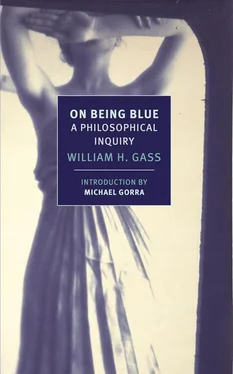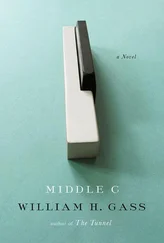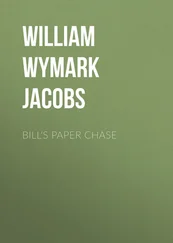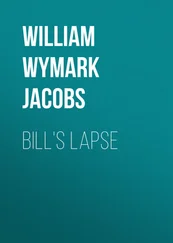He turned and looked at her. He waggled the pistol slightly and put it back in his coat, then he walked toward her. Moving, he made no sound at all; the released door yawned and clapped against the jamb, but it made no sound either; it was as though sound and silence had become inverted. She could hear silence in a thick rustling as he moved toward her through it, thrusting it aside, and she began to say Something is going to happen to me. She was saying it to the old man with the yellow clots for eyes. ‘Something is happening to me!’ she screamed at him, sitting in his chair in the sunlight, his hands crossed on the top of the stick. ‘I told you it was!’
Forty pages pass before Temple Drake begins to bleed.
It wasn’t nice of Thick to beat Margaret either, and I really don’t know if he did it beautifully or not, but Hawkes’s account is beautiful. Stones will never nourish us however patiently or hard we suck them. What fills us then, in such a passage?
It is Beckett’s wonderful rhythms, the way he weighs his words, the authority he gives to each, their measured pace, the silences he puts between them, as loving looks extend their objects into the surrounding space; it is the contrapuntal form, the reduced means, the simple clear directness of his obscurities, and the depth inside of every sentence, the graceful hurdle of every chosen obstacle, everywhere the lack of waste.
Compare the masturbation scene in Ulysses with any one of those in Portnoy, then tell me where their authors are: in the scene as any dreamer, night or day, might be, or in the language where the artist always is and ought to be.
If any of us were as well taken care of as the sentences of Henry James, we’d never long for another, never wander away: where else would we receive such constant attention, our thoughts anticipated, our feelings understood? Who else would robe us so richly, take us to the best places, or guard our virtue as his own and defend our character in every situation? If we were his sentences, we’d sing ourselves though we were dying and about to be extinguished, since the silence which would follow our passing would not be like the pause left behind by a noisy train. It would be a memorial, well-remarked, grave, just as the Master has assured us death itself is: the distinguished thing.
*It has the feel, the taste, of the Scots, even though it is French.
WHEN, with an expression so ill-bred as to be fatherless, I enjoin a small offensive fellow to ‘fuck a duck,’ I don’t mean he should. Nothing of the sort is in my mind. In a way I’ve used the words, yet I’ve quite ignored their content, and in that sense I’ve not employed them at all, they’ve only appeared. I haven’t even exercised the form. The command was not a command. ‘Go fly a kite’ only looks like ‘shut the door.’ At first glance it seems enough that the words themselves be shocking or offensive — that they dent the fender of convention at least a little — but there is always more to anything than that.
For example, when rice is thrown at a newly wedded pair, we understand the gesture to have a meaning and an object. Sand thrown at the best man misses its mark. Yet the rice, too, is being misused — neither milled, planted, nor boiled. Of course, rice signifies fertility for us. It resembles (indeed is) a seed. It is small and easily handled. It is light and lands lightly on its targets. It is plentiful and easily come by. And it is cheap. In short, rice is like three cheers, good luck, and God speed . Rice is like language. Similarly, when we swear we say we let off steam by throwing our words at someone or at something. ‘Fuck you,’ I mutter to the backside of the traffic cop, though I am innocent of any such intention.
Crude as it is, the case allows us to separate what is meant from what is said, and what is said from what is implied, and what is implied from what is revealed. Cursing dares convention and defies the gods, yet, as conventional itself as the forms it flouts, cursing does not dare defy the conditions of wholesome clarity, and ‘fuck a duck’ is admirable in that regard. Nor did I labor to invent the phrase. No one invents them. ‘Jesus Christ on a raft,’ an expostulation of my youth, did not catch on. I may choose to throw rice at newlyweds, but I do not — cannot — create the gesture. ‘May shit fall upon you from a biplane’ will hardly earn a medal for the imagination; nevertheless it is clearly something someone composed, and therefore not a curse at all, but a joke (as ‘fuck a duck’ is). At great cost, comedians have such curses composed for them. They often concern camels.
Although the expression says ‘hunt up a duck and fuck it,’ the command quite routinely means ‘go away; pursue some activity suitable to your talents, something disgusting and ineffectual like fucking a duck.’ Nonetheless, of all the fish and fowl, all the plants, animals, images, and other elements of the earth which provide some sort of aperture, it was the uck in ‘fuck’ that selected ‘duck.’ I might have said ‘fuck a fox’; however, the modulation of uck into ox is too sophisticated for swearing, and a fox has, in every way, the nobler entry. ‘Fuck a trucker’ is equally sound (though it tails off doggily), but the command calls for courage and so scarcely carries the same disdain. In these days when letters to the editor may contain instructions on how to masturbate with a vacuum cleaner, cucumber, or cantaloupe, the directive, ‘fuck a fruit,’ has become facetiously indeterminate. I happen to like ‘fuck a lock,’ nevertheless this phrase proves my point. One may admire its subtle comparison of ‘pick’ with ‘prick,’ or the happy resonance of ‘lot’ and ‘lock,’ ‘or that humorous reference to the chastity belt, but successful swearing can afford to be baroquely outrageous only if it also remains as straightforwardly open and sharp and quick as a slap.
In ‘go to hell’ and ‘fuck you,’ the words have been glued together by thoughtless use and mindless custom. We do not speak them the way we speak ordinary sentences. They are not said, but recited, like ave maria s; so if I say ‘damn you’ and really mean you to be damned by a vengeful god at my behest, I have said ‘damn you’ the way I daily say ‘let’s eat,’ and that is a way no one says ‘damn you’ any more, because curse-blue sentences are made of welded parts like the bumpers of automobiles, while with this revitalized ‘damn you,’ I have tried to make the phrase the way I once made ferris wheels and towers out of tinkertoy by following instructions.
Swearing consists of a series of cultural quotations, and although others may have said ‘let’s eat’ before me, and although I may have said ‘let’s eat’ many times already myself, I am not reciting or quoting, repetition is no part of my intention, I am hungry again, that’s all; while if I say, to the lady lying under me, ‘hurry up, please, it’s time,’ I am quoting, and my fucking may be quoting, too, if it endeavors to recover another copulation and a previous joy by magical adherence to the past.
Crude as it is, then, the case allows us to separate sentences and phrases which are truly created from those which are merely routine; and those which are squeezed out of daily life like the juice of a lime, however customary, from those which are tongued or sung or spelled or recited. The sentences of ordinary speech, of hunger and seduction, gossip and commerce, are sewn from patterns, put together according to blueprints and plans. We have been taught several simple ways to ask for water, grant physical favors, spare a dime. For water, ‘water!’ does very well, and anything much more complicated, anything original, discriminating, or interior, suggests that our thirst is not any deeper than the bottom of our throat.
Читать дальше












